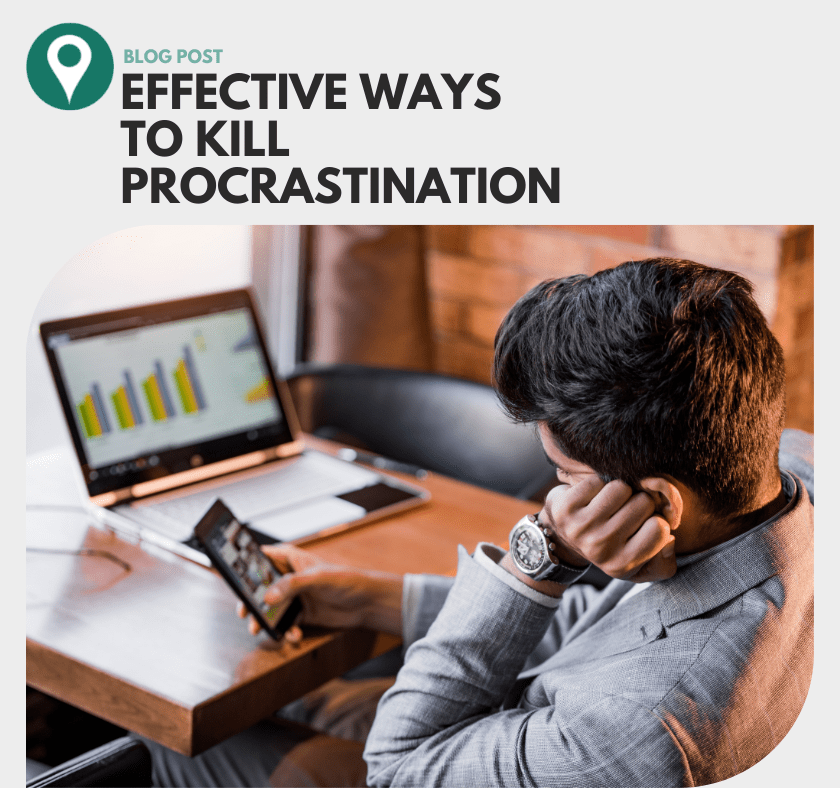It’s Sunday evening, and time is running out. Before the deadline of Monday, you’re frantically working on a task while inwardly berating yourself for putting it off earlier.
What happened? How did I lose concentration?
In addition to the unnecessary “preparation,” the coffee breaks, and the hours spent on other work that you might have safely delegated to next week, there were also the hours that you wasted scrolling through social media, taking a nap or even talking on the phone about the shocking weekend updates.
Sounds recognisable? In that case, you are not alone!
How to Stop Postponing Things
Procrastination is a habit that can be broken, much like most other habits. To cope with it and avoid procrastination, use these steps:
Step 1: Acknowledge Your Procrastination
Perhaps you might be delaying a project due to having to rearrange your workload’s priorities. You aren’t technically procrastinating if you’re short delaying an important responsibility for a genuinely excellent cause. But you’ll know you’re probably doing it if you begin to put something off endlessly or change your priorities to prevent doing anything.
Some signs of procrastination:
- Filling your day with low-priority activities
- Despite the fact that it is a crucial task, you keep putting it off.
- Begin a high-priority project and get up to make coffee.
- Wait to start a task when you’re in the “proper mood” or when the moment is right.
You can also take a self-test quiz to see if you are a procrastinator.
Step 2: Determine WHY You’re Procrastinating
Before you can start to address your procrastination, you must first understand why it is happening.
Do you avoid a certain work, for example, because you find it tedious or unpleasant? If so, take action to get it done as soon as possible so you may concentrate on the parts of your university work that you enjoy more.
Procrastination may result from a lack of organisation. Because they make effective plans and employ prioritised To-Do Lists, organised people are capable of overcoming it. These tools aid in task prioritisation and deadline management.
Even if you’re well-organised, a task can nevertheless make you feel uneasy. Perhaps you put it off and find comfort in working on tasks that you know you are capable of finishing because you are unsure of your abilities and scared about failing.
Interestingly, procrastinators tend to be perfectionists. They frequently choose to forego performing a task they don’t feel competent to complete rather than perform it poorly.
Poor decision-making is yet another significant factor in procrastination. If you are unsure of what to do, you’ll probably put off taking action out of concern that you could make a mistake.
Warning:
Procrastination can be more than just a poor habit for some people; it can also be an indication of a major health problem. For instance, procrastination is linked to conditions including ADHD, OCD, stress, and depression.
Accordingly, if you have persistent or crippling procrastination, one of these disorders may be to blame, and you should seek the guidance of a qualified specialist.
Step 3: Use anti-procrastination techniques
Procrastination is indeed a habit, a deeply established practice of behaviour. This implies that it won’t likely be easy to break overnight. Try as many of the tactics listed below as you can to increase your chances of success because habits simply stop being habits when you stop doing them.
- Forgive yourself if you’ve ever put off something. According to studies, self-forgiveness can boost your self-esteem and lessen your propensity to put things off in the future.
- Stick with the assignment. Focus on doing rather than avoiding. You should list the things you need to do along with a deadline. This will enable you to approach your work with initiative.
- Provide a reward for yourself. Consider rewarding yourself with a treat, such a piece of cake or a cup of coffee from your preferred coffee shop, if you successfully finish a challenging task on time. And be sure to take note of how satisfying it is to finish!
- Request a check-up from someone. Peer pressure is effective! The idea underlying self-help groups would be this. An online programme like Procraster can assist you with self-monitoring if you don’t have somebody to ask for support.
- Take action as you go. Deal with duties when they come up rather than putting them off for another day.
- Keep distractions to a minimum. While working, turn off your email and social media, and stay away from any TVs in the room.
- Tackle all those stuff that you consider least enjoyable first. You can then focus on work which you feel more entertaining for the remainder of the day.
Now that you’ve read this, you should have a solid grasp of procrastination and your options for overcoming it. The next time you put anything off, identify the type of procrastination you’re dealing with and track down its true cause.
We hope that some of these tools you can integrate into your everyday life and improve the skills you need for a happy and productive university year and later on in your career.
